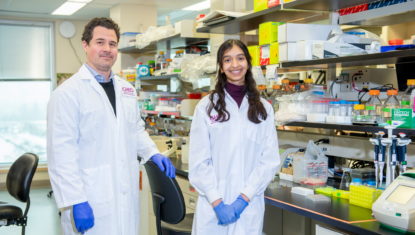19/02/2025
Ottawa, Ontario — Wednesday February 19, 2025

Researchers at the CHEO Research Institute and University of Ottawa Faculty of Medicine are developing a first-of-its-kind immunization to protect against neuroblastoma, the most commonly diagnosed cancer for children under the age of one.
The research study is being led by Eknoor Walia, a graduate student at the University of Ottawa’s Faculty of Medicine, who is working closely with Dr. Tommy Alain, Senior Scientist at the CHEO Research Institute, and other researchers on the project.
The immunization uses respiratory enteric orphan virus, also referred to as reovirus, known for its ability to infect and kill cancer cells while sparing healthy cells. By manipulating reovirus to act as a viral vector, the immune system can be trained to identify and destroy cancer cells. Reovirus is often used in cancer-related clinical trials but has never been leveraged in this way before.
“The hope is that if the reovirus immune booster shows promise in treating neuroblastoma, eventually we can test it against other cancers too,” said Walia. “If we can increase the overall repertoire of effective cures we have available for cancer then we have more to offer patients in terms of treatment options, especially if the cancer re-emerges following treatment.”
The team has opted to design the immunization to be administered orally, making it less invasive and more comfortable for patients in comparison to traditional methods such as intravenous or intratumoral injections. This novel approach is especially important given that neuroblastoma is far more common in children than adults.
The immunization will be delivered alongside other therapies, such as immunotherapy. Immunotherapies function by boosting the immune system so that it remains on high alert for cancer cells—which have their own mechanisms for evading detection. Together, these treatments can enhance the body’s ability to fight cancer.
Neuroblastoma can be hard to treat due to the various ways it can present in a child’s body. It develops in immature nerve cells within the sympathetic nervous system, but it can easily metastasize and spread to other parts of the body.
Routine treatment options for children include chemotherapy and surgery, but those in the intermediate to high-risk category often relapse, facing survival rates as low as 10%. While still in the early stages of research, this immunization could offer hope for treating one of the most common pediatric cancers.
Reovirus Shows Promise for the Future of Cancer Treatment
“We are excited about the potential of reovirus, not only as a breakthrough in treating an extremely common childhood cancer but also in redefining how we prevent and treat cancer,” said Dr. Alain, whose lab at the CHEO Research Institute focuses largely on cancer research. “By combining cutting-edge therapies with existing treatments, we are working to improve outcomes and provide new hope for patients who need it most.”
His lab has tested and confirmed the ability of reovirus to alleviate colon cancer in mice, a finding that has set the stage for further research into how this virus could transform cancer prevention and treatment.
In addition to supervising Walia’s project, Dr. Alain is also the Principal Investigator on a project advancing an oral reovirus immunization designed to clear malignant cancer cells in the digestive tract, prevent cancer progression in the colon, and act as an anti-cancer immune booster. This project is funded by the Canadian Institutes of Health Research.

